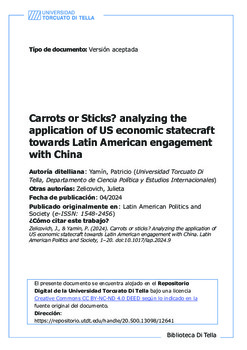| dc.rights.license | https://creativecommons.org/licenses/by-nc-nd/4.0/deed.es | es_AR |
| dc.contributor.author | Yamin, Patricio | es_AR |
| dc.contributor.author | Zelicovich, Julieta | es_AR |
| dc.coverage.spatial | América Latina | es_AR |
| dc.coverage.spatial | Estados Unidos de Norteamerica | es_AR |
| dc.coverage.spatial | China | es_AR |
| dc.date.accessioned | 2024-05-06T17:30:46Z | |
| dc.date.available | 2024-05-06T17:30:46Z | |
| dc.date.issued | 2024-04 | |
| dc.identifier.uri | https://repositorio.utdt.edu/handle/20.500.13098/12641 | |
| dc.identifier.uri | https://doi.org/10.1017/lap.2024.9 | |
| dc.description.abstract | Geopolitical competition between the United States and China has led to an increased
reliance on economic statecraft. In this context, understanding the conditions that
trigger trade, aid, or investment weaponization becomes crucial. This paper examines
how the US has employed economic statecraft in response to Latin American countries'
engagement with China. The study revisits the theoretical debate on positive and
negative economic statecraft and proposes a mechanism that identifies the conditions
under which “carrots” or “sticks” are more likely to be employed. We argue that the
US response towards Latin American countries' engagement with China tends to
prioritize economic engagement over economic coercion, particularly when dealing
with countries that are politically and economically aligned with Washington policies.
To test our argument, we adopt a mixed-methods approach. First, we conduct a case
study analysis on the US-Panama relationship. Second, we perform a statistical analysis
to assess the impact of economic engagement with China on the allocation of American
foreign assistance in the region. | es_AR |
| dc.description.sponsorship | Esta es la versión aceptada del artículo que se publica según las políticas editoriales de la revista Latin American Politics and Society | es_AR |
| dc.format.extent | 43 p. | es_AR |
| dc.format.medium | application/pdf | es_AR |
| dc.language | spa | es_AR |
| dc.publisher | Cambridge University Press | es_AR |
| dc.publisher | Latin American Politics and Society (e-ISSN: 1548-2456) | es_AR |
| dc.relation.ispartof | Latin American engagement with China. Latin
American Politics and Society, 1–20; e-ISSN: 1548-2456 | en |
| dc.rights | info:eu-repo/semantics/openAccess | es_AR |
| dc.rights.uri | https://v2.sherpa.ac.uk/id/publication/222 | en |
| dc.subject | Economic Statecraft | es_AR |
| dc.subject | Geoeconomic Competition | es_AR |
| dc.subject | International relations | es_AR |
| dc.subject | Relaciones internacionales | es_AR |
| dc.title | Carrots or Sticks? analyzing the application of US economic statecraft towards Latin American engagement with China | es_AR |
| dc.type | info:eu-repo/semantics/article | es_AR |
| dc.subject.keyword | Belt and Road Initiative | es_AR |
| dc.type.version | info:eu-repo/semantics/acceptedVersion | es_AR |

